
As we race further and faster toward a global war between Christians and Muslims, and as we feel compelled to choose sides, I have to think back to my childhood. One of the blessings of my youth is that my parents raised me in the simple, small life of the South Suburbs of Chicago. When we landed, the overwhelming majority of South Asian immigrants took residence in the North and West sides. The blessing is not that I was raised away from most other Pakistanis and Indians. Rather, that I grew up in a town that boldly, humbly calls itself a “Community of Churches.” It is a small town that banned all business on Sundays and prohibited any liquor sales any time of the day or week. And, what becomes more important is that when watching a film like Ridley Scott‘s “Kingdom of Heaven” (2005), I remember my wonderful neighbors, childhood friends, and teachers far more than I remember the television and internet bigots who today masquerade as Christians, no matter how many of them there seem to be.
Page design by Marie Haws.
In the Director’s Cut, “Kingdom of Heaven” is the story of a mourning widower (Orlando Bloom), living in a time of despair, traveling across nations, making his way not only to Jerusalem, but to the Holy Sepulchre itself, seeking solace and forgiveness. Along the way, he becomes a reluctant Hollywood hero. More than that, he is seeking for God to enter into his heart.

The unfortunate thing about “Kingdom of Heaven” is that it will be remembered as a bloody action movie set in the Middle Ages. And some will take offense to the criticism it gives of many of the Christian characters, overlooking that multiple types of Christians are present. Though a few are rather vile, most of the Christians in the film are upright, self-conscious, and sympathetic. In contrast, the film falls into the usual traps of showing Muslims overwhelmingly as violent. Salah al-Din (Ghassan Massoud) is occasionally presented as civilized, sensitive, and cautious. But the moments we remember are moments of swift brutality. The depiction of the Muslims in this film recalls the unending supply of gun toting Somalis in the otherwise great “Black Hawk Down,” or the mobs of African-Americans in “American Gangster.” And, on that note, the main females in this film are adulterers, servants, or are just silent. The point here is that this is a film by Westerners, for Westerners that seeks to rise above the flock.

The film starts with the burial of a suicide victim, the wife of Balian (Bloom). I think back to a suicide in my own life, one of a few. I had a friend who shot himself. The event caused such a rupture in my system that, for the life of me, I could not remember my friend’s name for the next six months. Years later, I remember his face clearly, though I do not remember a smile. But, I still sometimes have trouble remembering his name. In some ways, I remember a ghost more than a friend.
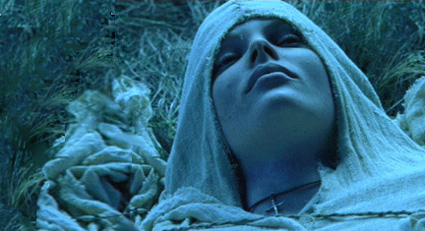
Thinking further, I get troubled reading the narratives of despair of American soldiers who take their own lives. Many soldiers have taken my classes, and so many seemed so deeply wounded. Some were taking my classes out of a sense of profound guilt for killing Iraqi or Afghan Muslims. Others were seeking to build bridges. Others were simply curious or were fulfilling course credits. Others just seemed like ghosts walking along into class.
Or, thinking further about suicide, I think about those moments of sitting at work during my previous career in the Fall of 2001, staring at photos of the planes in the seconds before they hit the World Trade Center. I could not make sense of it then or now: when people are racing toward oblivion to fulfill an ideology, it boggles the mind. What happens in the mind of a Shinto or Buddhist Japanese Kamikaze speeding his plane into an American Battleship? What happens in the mind of a Hindu Tamil Tiger in the seconds before a Suicide Bombing? And, all of that is before thinking about the others who are killed in the process.
I went into a serious depression, that became a quicksand of deluded warmth against the pariah status America’s geopolitical situation had granted me (as a Muslim). It is easy for many Americans, without having lost any family or friends on 9/11, to claim victim-hood and grief. But, Muslims have been forced to answer for it, repeatedly, and continue to do so today. Years later, for some reason related to my love of movies, I decided to watch the opening screening of “United 93.” It was such a powerful film, so well made, so frightening, that it knocked me headfirst back into depression. Have you ever watched a movie that drop-kicked you over an edge? I have so respected that movie that I bought a DVD of “United 93” that has been sitting on a shelf now for years, sitting about six feet away from me right now, still unopened.
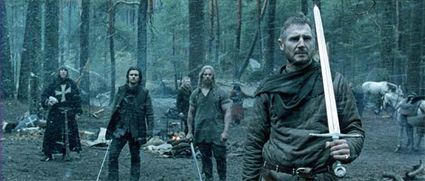
So here, we visit Balian (Orlando Bloom), an unknown blacksmith in a small black and blue crevice of France, expecting a simple, small life that will end someday with his grave dug within a hundred feet of his place of birth. His newborn son dies. His wife succumbs to her depression. Struggling to cope with two deaths, he follows an expected set of stages. He gets lost in memories of smiles. He caresses his wife through the grass of her grave. He detaches by discarding old belongings. He escapes by immersing himself in his work. And he fills himself with rage. Something must fill the hole, but nothing fits. It is said that Scott originally intended Russell Crowe to play the role of Balian, and that would have made for a very different character. Still, Bloom’s longing eyes alone carry much of the film, matched by either Massoud’s piercing gaze or Eva Green‘s own mesmerizing irises.


After a series of destructive events, he makes his way to Jerusalem, described to him as the land of forgiveness, the center of the earth, the end of the world, the kingdom of conscience, the land of opportunity. Whatever Jerusalem offers, he is still escaping. Most escapes are searches; he searches to mend that gaping tear that seeps through his chest, hoping for God to seal it. He does try to fill the hole by calling on God, and seems to hear nothing. Unexpectedly, however, the King of Jerusalem (Ed Norton) calls on him to dedicate himself to protecting the helpless. That mission sounds very much like the Christianity of my neighbors.


Sometimes we choose our battles, and sometimes our battles choose us. As a child in the South Suburbs, I expected to grow up to become a doctor or a filmmaker. I did not expect to someday be publicly speaking in any serious capacity. In the first eight years since 9/11/01, I had been called upon to give some two hundred, maybe three hundred lectures, classes, and sermons on Islam. In the past three years alone, conversation on Islam has escalated, and the number of talks I have given has surpassed 1200. If depression can be cured, mine is behind me. But, in the process, I have also been approached by countless people of all ages, all faiths and non-faiths, seeking healing. So many broken families, drug problems, so many victims of abuse, rape, struggles of faith, struggles of well-being. You would think that half of America is of broken soul. I think it is most of America, it is just that most of America is not capable of admitting it to itself, for that would shatter the mythologies we hold about ourselves.
And we see that in this film. While every character speaks of a life in Jerusalem determined by their own consciences, we find all the main characters imprisoned by fate and destiny, as though God wills it. A king (Ed Norton) with the authority to give life and death, shackled by leprosy. A princess (Eva Green) with the freedom to show whichever face to whomever, yet imprisoned in a political marriage. A husband (Martin Csokas) whose unfulfilled sense of entitlement clouds his ambition into wanton destruction. A lunatic Templar (Brendan Gleeson) who acknowledges that he is not capable of being anything but a bloodthirsty savage, but consoles himself with the reassurance that someone must take on that role. A servant to the king and marshal of the city (Jeremy Irons) who dedicated his life to God and Jerusalem, only to feel that God has left him. Jerusalem is the promise of ultimate liberation, and each character is in a position of great power and prestige, yet each character is shackled and empty.

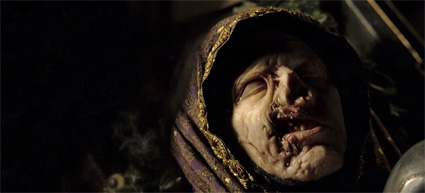
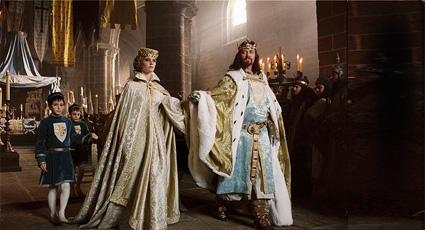
<img alt="kingdom_of-Heaven_Marton Csokas.jpg” src=”https://static.rogerebert.com/redactor_assets/pictures/far-flung-correspondents/racing-toward-oblivion/kingdom_of-Heaven_Marton_20Csokas.jpg” width=”425″ height=”229″ class=”mt-image-center” style=”text-align: center; display: block; margin: 0px; float: none;”>

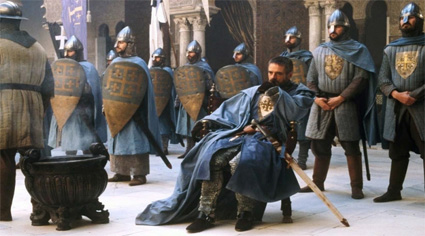
That is one of the recurring questions in the film: God’s will versus human will. Is it God’s will that causes suffering? Is it God’s good favor that leads to military triumph? In the film, many fighters claim to know God’s will, that God’s will supposedly demands them to race into war. “God wills it” becomes little more than a slogan of blood lusting cheerleading. That is also a test today for someone’s faith. When I meet people today, calling for war or violence, I assume that theirs is the same empty approach to religion. The pastor of the largest church near my home openly states that every time an American soldier is killed in Afghanistan or Iraq, we should respond by tearing down a mosque. I pity him and the flock he is exploiting. When a person claiming to be a believer of any religion is calling on our nation to attack Iran, again, they are telling me that their approach to their religion is empty of any substance, replaced with nationalism and aggressive economic theories. The same applies for a preacher calling on violence against Israel. When we reduce a population to a one-word name of nation and a hostile assumption, then we have already dehumanized the people.
And, I have been to Jerusalem. Detained at the Egyptian-Israeli border for ten hours, getting repeatedly questioned about every page in my American passport as well as every relative in every country. In breaks between interrogations, I chatted with Israeli soldiers who seemed perplexed that Jews took my classes on Islam, but also seemed more ambivalent than nationalist about relations between Jews and Muslims. If we were to follow today’s press, as well as a few agenda-driven historians, we would assume that Jews and Muslims have survived 1400 years of mutual hate, even though history presents a very different picture. Traveling through the nation, I saw enough check points and armed soldiers to make the Kingdom of Saudi Arabia look like an open society. I saw towns that look like American suburbs in the desert, separate from the Palestinian compounds that looked like open-air prisons. I also met a number of drug-infested American kids who seem to be living in Jerusalem because the Palestinian cause is apparently the cool cause. I prayed in the serene calm of the al-Aqsa campus, finding out in the news that it was raided a few days later by hundreds of zealots celebrating some miscellaneous anniversary. This is the consequence of nationalism, I suppose. Had I not regarded the heart of each human, Israeli, Palestinian, Jewish, Christian, Muslim as sacred, I would have misdirected my repulsion away from power and would have wrongly directed it toward people.
And, I also know that problematic mix of religion and nationalism, considering that I am from Pakistan. Carved into the world and recognized just a few months prior to Israel as a democratic Muslim state, a safe haven for Muslims. It was the object of romanticized dreams that required not only a mass migration of one population in, but also a mass migration of another population out. Carved in such a way by the British occupiers to cause a serious political, cultural, and psychological split between regional populations that had a history of respect more than hatred. In Israel, I am speaking of Muslims and Jews. In the Subcontinent, I am speaking of Muslims and Hindus. Both nations now face the massive rise of an ultra Right wing not known for respect of other populations, embodying simplistic interpretations of sacred texts. The point here is not that Israel and Pakistan are twins, for the trained historian in me cannot accept such simple comparisons. The point is that the nations are not as unique as they think they are, especially in problems relating to religious nationalism, especially when preachers here and there preach of the apocalyptic rhetoric of the end of the world. And more than that, I don’t see much that is holy in the holy lands, beyond the human hearts. The problem of nationalism is a serious problem.
And let us speak of the apocalypse. We see it today; we saw it then. Another commonalty among many believers is the search for signs of the approaching apocalypse. The spread of disease and vice, massive political unrest, the multitude of earthquakes, and an overall sense that life no longer mimics the quiet television shows of the 1950s. In the search for the apocalypse, there is that innate hope to skip to the last chapter of the adventure novel. More than that, there is an innate hope for “my team” to win. Again, speaking primarily of Christians and Muslims, their goal for Jesus, may peace be upon him, to establish thousands of years of (Christian) peace, or the goal for a global Islamic polity providing peace and security for all. Christian apocalypticists seek Christian triumph. Their Muslim counterparts seek Muslim triumph. Nobody remembers the part about peace, but most everyone remembers the wars that would precede it.
And, in the process, when people focus especially on the apocalypse, personal conduct is ignored, personal mortality is ignored, but what grows as the inevitable consequence is a belief in conspiracy theories, that are often headed by some sort of anti-Christ. The assumption then, is that entire populations of believers in other religions are cast as members of the conspiracy. It is now common in American rhetoric to assert that Muslims are engaged in a secret conspiracy to take over America through a secret plan of spreading the Sharia. In Malaysia, Christians were banned by the government from using the word “Allah” even though Arab Christians, Jews, and Muslims identify God with “Allah.” The argument was that Christian preachers were allegedly using “Allah” to trick Muslims in to converting to Christianity. Of course, there is little mention that a better practice of Islam in an increasingly corrupt government could deter any conversions better than legislation can.
That belief in conspiracy theories compels a sense for the believer to become a defender of the faith. Meaning, the Christian or Muslim who believes in conspiracy theories then feels compelled to look out for and fight against the forces of evil outside the religion, as well as the forces of apology inside the religion. Others seek to “force God’s hand” and speed up the apocalypse. In the film, we meet the Knights Templar.

It would be an understatement to say that Ridley Scott despises the Knights Templar. But, he makes them such delicious villains. You hate them, but you cannot stop watching them. Martin Csokas’ Guy de Lusignan is the short fused hypocrite disgusted by any relationships with or any concessions made for any Muslims, because those behaviors are – to him – compromises of faith. Brendan Gleeson’s Raynald of Chatillon is the renegade leader waiting for the moment to spill blood and walk into an inevitable victory. They see themselves as victims. De Lusignan sees himself as a victim of his wife’s coldness and infidelity. He sees himself as a victim of the King’s treaties with the Muslims. He sees himself as a victim of the social class upheaval in Jerusalem. When someone looks at him or herself as a victim, it becomes easy to justify the most savage behavior.
Right now, we are seeing their Muslim counterparts burning down American embassies. This is not radical Islam or Islamism anymore than the Templars or the KKK are some form of radical Christianity or Christianism. What they illustrate, however, as the movie illustrated so well, is that in times of chaos, the vile actions of a few can ignite the passions of the many, and a war between hundreds of thousands. Those few actions might be something as savage as a murder, or something as obnoxious as a video or a cartoon.
Regarding the current unrest in Libya, the part that did not make the news was that these same Muslim squads were destroying Muslim graves of important scholars just a few weeks ago. All in the name of their versions of Islam. They have become the Templars of modern Islam, absence of faith, full of Nihilist rage and selectively quoted scripture. And, more than that, they are accelerating the race toward a global war between Muslims and Christians, speeding us toward oblivion under the pretext of collective victimhood. The difference between then and now, is that back then a few people were able to compel armies to clash violently. Today, however, we face one of the biggest questions of our generation: is it possible to prevent today’s democratization of violence, where a small handful of zealots can cause the amount of carnage that in the past could only have been accomplished by armies? This is case of Oklahoma City, WTC 1993, 9/11 and every single school shooting of the past decade. Our nation is addressing this question with the PATRIOT Act, NDAA and drone strikes that are killing some suspected “militants” and many civilians. Otherwise, this question remains mostly ignored.
And the problem does not remain overseas, there is one Christian movement in America that screams “Political correctness” whenever anything non-negative is stated about Islam in our press. “Political correctness” is not partially code language for “Islam is given a free pass, while Christianity is often criticized.” It is only partially true, because they rarely jump to defend the most consistently vilified person in the American press, the Pope. “Political correctness” is code language for “we are victims of the American mainstream media.” They would know that the overwhelming majority of references to Islam by the same mainstream media that they vilify still present Muslims in association with violence. But, when I talk to those particular Right wingers among the Muslims, and these particular Right wingers among the Christians, it is like talking to the same people. In real life, they are not villains. They are people who have been suckered in by self-righteous hypocrite preachers. Sadly, it’s not just Christian majority countries like ours that are witnessing this rise of a hypocritical victim mentality. It’s happening in every corner of the globe across every religious tradition. Right now, in Myanmar/Burma, Rohingya Muslims are suffering a genocide at the hands of Buddhists. India has already seen the rise of the Right wing Hindus of the BJP. And Muslims are singling out and attacking Christians in Muslim majority lands.
That is not to say that the Left wing has anything better to offer. We forget that Obama’s overtures to Muslim populations locally or globally are continuing GW Bush’s strategies. The problem of the far Left, however, is that religion still gets mocked as the playground of mythology and stupidity. I also used to wonder if a world without religion is better than a world with religion. But, I have studied the major philosophies and theories across cultures, across religious traditions. I have gone through all the fundamentalist Atheist pundits of today, and found their arguments to be silly, selective and often obnoxious, especially compared to the thought of the Atheists of a century or more ago. The Atheist authors of recent history were stronger in their attacks on European religion than on religion in general. And, if we take the secular point at face value, I find it appalling that Western Academia does not give Thomas Jefferson the same esteem it gives Locke, Rousseau, Hume, Descartes or even Kant. Jefferson established an amazing model of governance, contending with religion in a matter not disrespectful. Of course, it could not have been established without a prior genocide, but that is the stuff of a different conversation. The point here is that the question becomes irrelevant: religion is here to stay.
What I appreciated about “Kingdom of Heaven” is that it does not hope for a world without religion, as much as it regards religion as a reality of life. Christianity and Islam are here to stay. I am thrilled that a few Muslim and Christian and Jewish leaders in Chicago have taken it upon themselves to generate strong relationships, not despite their religions, but because of their religions.



So, what then is the overall message of “Kingdom of Heaven?” We inherit the mistakes and traumas of previous generations, choosing our battles for us. More than that, however, we are and will be a product of our choices. We are accountable for our choices. A queen can consider herself trapped as a queen, yet she has the power to step down into anonymity. A man can seek God in the holy land, not find Him there, yet find Him finally in his own heart. I believe that what ultimately cured my own depression, despite a murky decent, was service to hearts of those around me.
The first time I slept over my neighbor’s house, my host asked if I believed in Jesus, may peace be upon him. With the force of a first grader I said, “No.” Of course, that answer was wrong, for a Muslim believes in Jesus as being among the greatest and most important of all creation, standing alongside Abraham, Noah, Moses, and Muhammad, may peace be upon them all. But, what is of more importance here is that my rejection pushed my neighbor to cry himself to sleep, crying over my salvation. And, what is of more importance than that is that that moment has stayed with me more than three decades later.
And, I hope that if I left a good impression on him and my other childhood friends, neighbors, and teachers, that when they see Muslims associated with violence, they think of me and my simple, small life in contrast.











